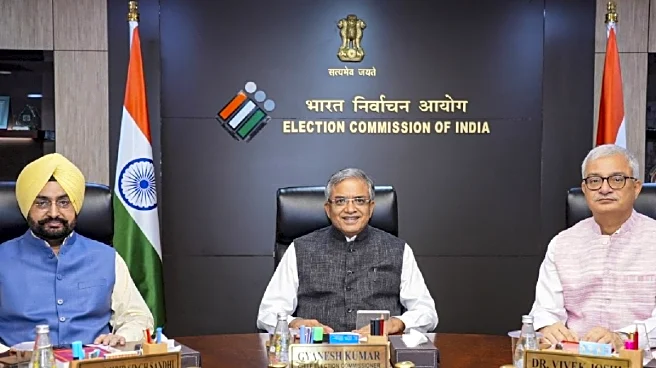The Election Commission of India (ECI) on Wednesday began a two-day conference with Chief Electoral Officers (CEOs) from all states and Union Territories to finalise its plans for a nationwide Special Intensive Revision (SIR) of electoral rolls. The exercise aims to clean up voter lists across the country, with a special focus on removing ineligible and illegal entries, including suspected foreign nationals.
Chief Election Commissioner Gyanesh Kumar and Election Commissioners SS Sandhu and Vivek Joshi are leading the discussions, which will continue till Thursday. This is the second such conference since September dedicated to preparing for the massive voter list revision.
One of the key proposals under discussion is conducting the SIR in phases,
starting with states scheduled to hold assembly elections in 2026 — namely Assam, Kerala, Puducherry, Tamil Nadu, and West Bengal. A few other states may also be included in the first phase, officials said. However, the SIR will be deferred in states where local body elections are due, to avoid overburdening the election machinery.
The SIR has already concluded in Bihar, where the final electoral roll — featuring around 7.42 crore names — was published on 30 September. When announcing the Bihar elections, the CEC had noted that the Commission was preparing for a countrywide SIR and would soon decide on rollout dates.
Last month, the EC directed state CEOs to prepare for the exercise within 10–15 days and set a deadline of 30 September for preliminary preparations, including updating rolls from the last intensive revision. Many states have now uploaded their last SIR-based voter lists to their official websites. For instance, Delhi’s latest SIR dates back to 2008, while Uttarakhand’s was held in 2006.
Most states had their last SIR between 2002 and 2004. Mapping of current voters against these older rolls is nearly complete in many areas, officials said.
The primary objective of the SIR is to identify and remove ineligible voters — particularly illegal foreign migrants — by verifying their place of birth. This initiative has gained urgency amid ongoing crackdowns on undocumented migrants, especially from Bangladesh and Myanmar, in various states.
(With inputs from PTI)


/images/ppid_59c68470-image-177086012892069950.webp)
/images/ppid_59c68470-image-177086006108692667.webp)
/images/ppid_a911dc6a-image-177086002730792843.webp)




/images/ppid_a911dc6a-image-177086355446649864.webp)

/images/ppid_a911dc6a-image-177086352380239409.webp)
/images/ppid_59c68470-image-177086258246560927.webp)

/images/ppid_59c68470-image-177086254430548516.webp)
/images/ppid_59c68470-image-177086265857125048.webp)
/images/ppid_59c68470-image-177086262067478359.webp)
/images/ppid_59c68470-image-177086254645319037.webp)
